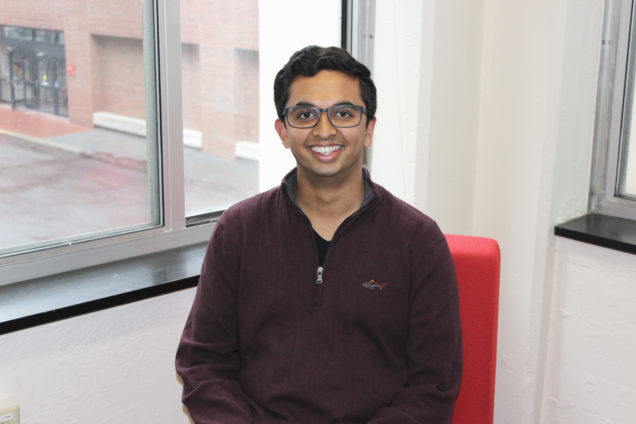ALUMNUS FEATURE: Abhinav Prasad

Every Saturday, a first grade Abhinav Prasad would follow his father to a weekly math tutoring program, and as his father would run the program, which assisted various schools in the Fremont, California area, Abhinav would teach. Here, long before his mind was on college or careers, his small hand would glide along sheets of paper, clenching a #2 pencil that would write numbers, equations, and solutions. All of this work was not for himself, but for the sake of others. For Prasad, teaching, advising, and mentoring experiences were constantly weaved into his experiences as a child. He recognized his ability to explain concepts to people, and took advantage of this gift by taking on positions such as peer mentor and academic coach as an undergraduate student at Boston University. When Prasad, class of 2017, graduated with a Bachelors in Neuroscience in three years, he completed his circle of lifelong advising by taking on the role of the Undergraduate Program in Neuroscience Program Administrator.
Prasad tackles many responsibilities in his office on the second floor of 2 Cummington Mall. His responsibilities include advising, managing various parts of the neuroscience program such as scheduling, and financing – managing the budget and placing orders. To Prasad, the most rewarding experiences are when overwhelmed students come in, and he’s able to help them through the situation, plan what to do for the semester and show them how to use the tools they already have to succeed in college. “Before anything, it’s part of my job to work with students just to make sure they’re okay,” Prasad said, “I want to make sure that they’ve found a place here and are comfortable with their surroundings. I know that when I came here my freshman year, being at BU amongst a bunch of strangers made me feel like I couldn’t reach my goal to advance myself. So I want to make sure that students are motivated and just happy with being in the place that they are.”
Prasad graduated from a competitive high school, one with an unhealthy atmosphere of over-ambitious students. When choosing colleges, his options were down to two paths: either remain close to home and stay in California or come to Boston University. “I decided that I wanted to escape that bubble I grew up in, escape that crowd and come to BU to start fresh,” Prasad said. “When I was deciding where to go, I talked to current students, and they told me about how BU is a place with academically oriented students, which is exactly what I wanted: an atmosphere where other students would be willing to work with me and have healthy competition.”
According to Prasad, healthy competition was precisely what he found at BU. As he took the 3,000-mile journey from west to east coast, Prasad had a clear idea of how he wanted to transform himself as he moved from high school to college. “I was fairly unmotivated in academics in high school, believe it or not,” Prasad said. “Had my high school ranked, I probably would have been in the bottom 10% of my class. So, I looked at BU as a second chance to show myself and those around me that I am academically inclined and that I do want to succeed in college and my career.”
Although he faced culture and environment shock as he took his first steps on Commonwealth Avenue, one thing that helped him adapt to his new life was FY101, the 1-credit seminar-style course for new students at BU. “That was a class that introduced me to a lot of people, to BU, and to Boston,” Prasad said. “Coming to BU, where the people and environment are different, was a challenge, and FY 101 helped me acclimate and get over my initial fear of interacting with people.”
Prasad became involved in research during his 4th semester of college at the Center for Autism and Research Excellence, but after a couple of months, he decided to try out something different. At the end of the same semester, he contacted his NE 204: Introduction to Computational Models of Brain and Behavior professor, Arash Yazdanbakhsh, and began working in his lab that summer. This experience helped him find his senior thesis topic, which focused on creating a novel experience to quantify cognitive processes of perceptual priming or the identification of an incomplete word in a word-stem completion test. In the future, Prasad would like to compare the performance of healthy control subjects to the performance of individuals with Parkinson’s and Alzheimer’s Disease. The eventual end goal, he says, is to figure out whether or not this test would be able to identify early cognitive markers for these neurodegenerative diseases.
This year, Prasad is in the process of applying to medical school. “At the beginning of college, I came in with a set plan: I’m going to major in neuroscience, go to medical school, and become a neurosurgeon,” Prasad said. “But I think college has really helped me broaden my horizons. I’m not going to decide exactly what I’m going to do, and that’s okay. I’m sure I’ll go into medical school and have various clinician experiences that will draw me into various fields in medicine, but as for exactly what type of clinician work, I’m leaving that up to myself in four years.”
From years of experience and advising, Prasad’s outlook on life and college had changed from when he first stepped on Commonwealth Avenue. “College is a time for you to explore your interests,” Prasad said. “If you come in with a strict academic focus, exactly how you want your GPA, exactly where or what you want to do after graduation, sometimes that will bring on a lot of unnecessary pressure. Instead, just allow yourself to explore your interests and see where one course takes you.”
Writer: Emme Enojado
Editors: Yoana Grigorova, Enzo Plaitano, Yasmine Sami